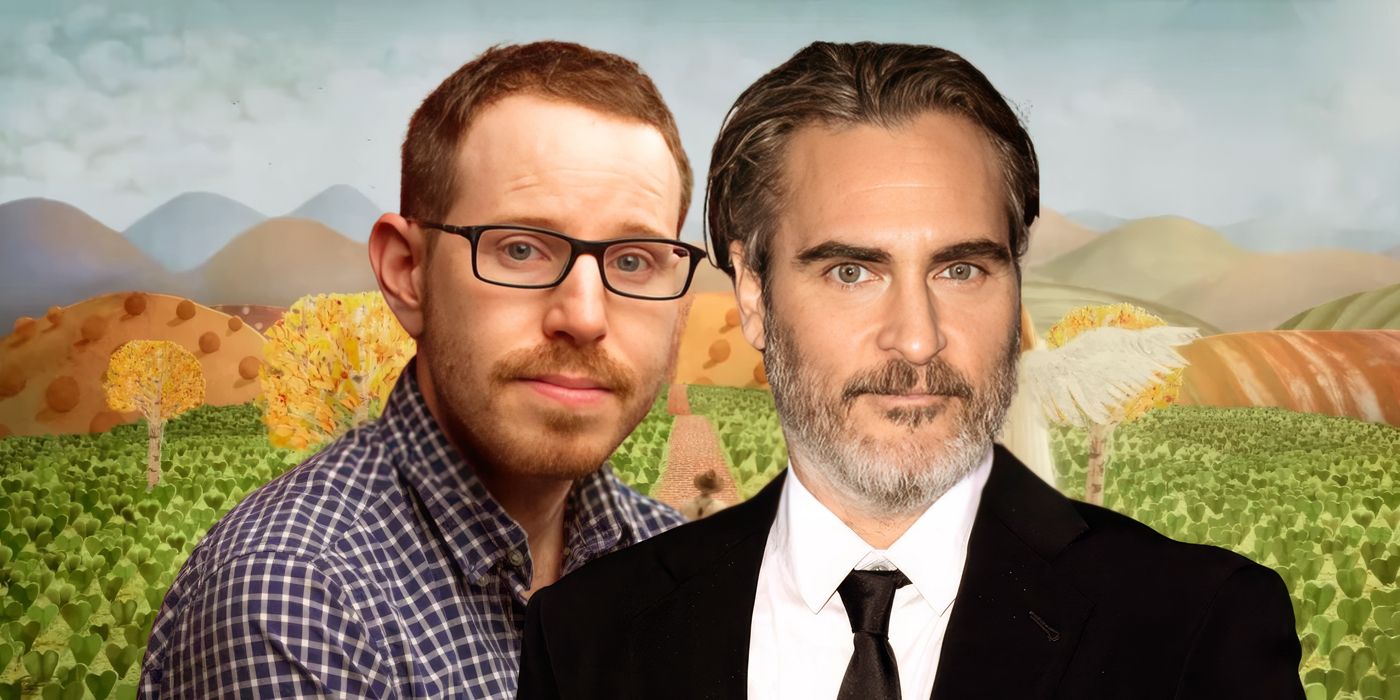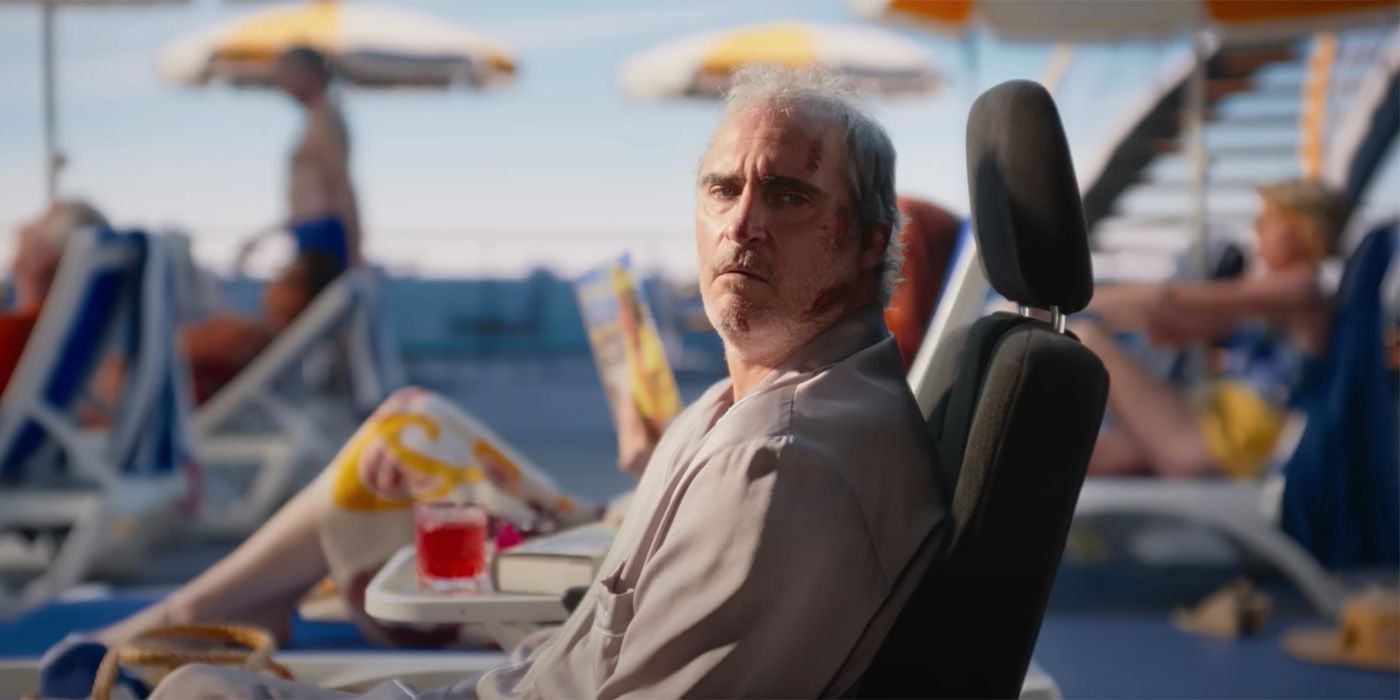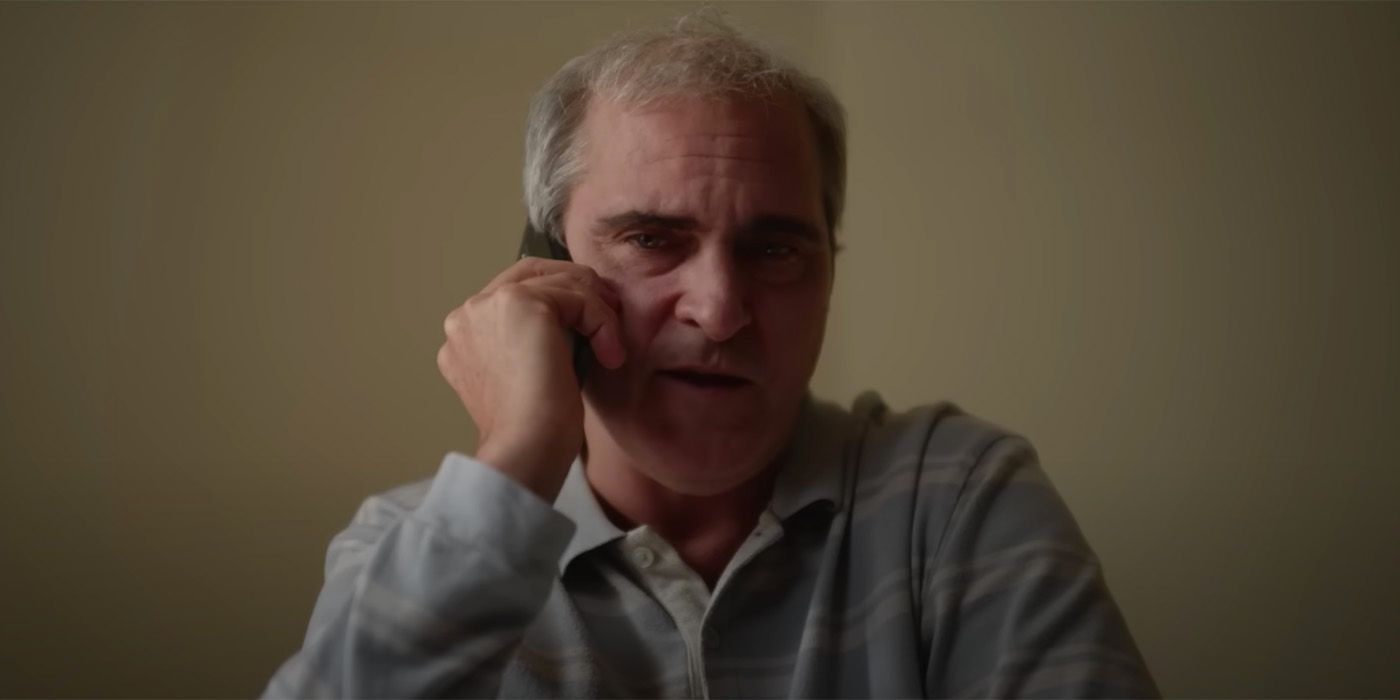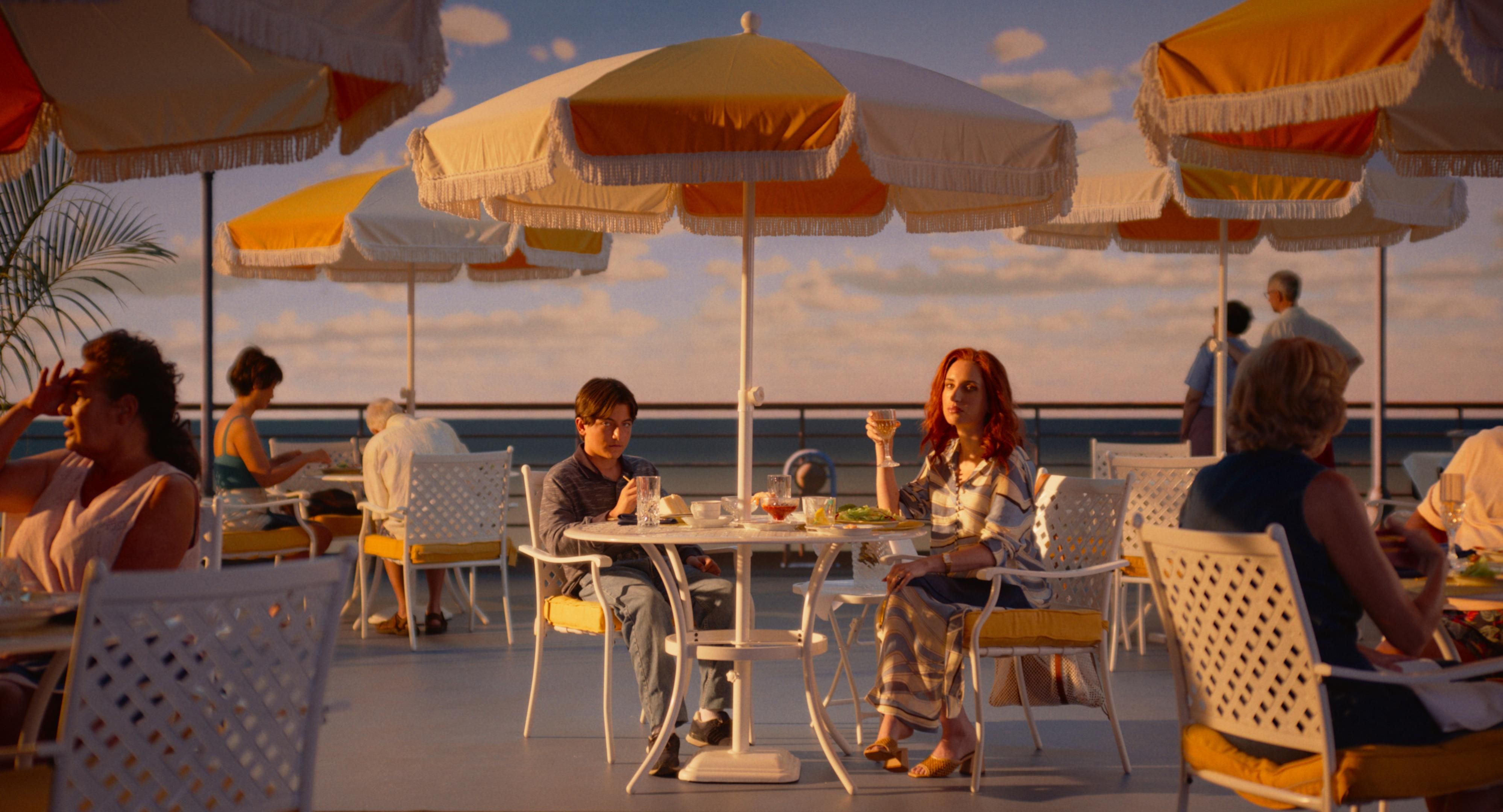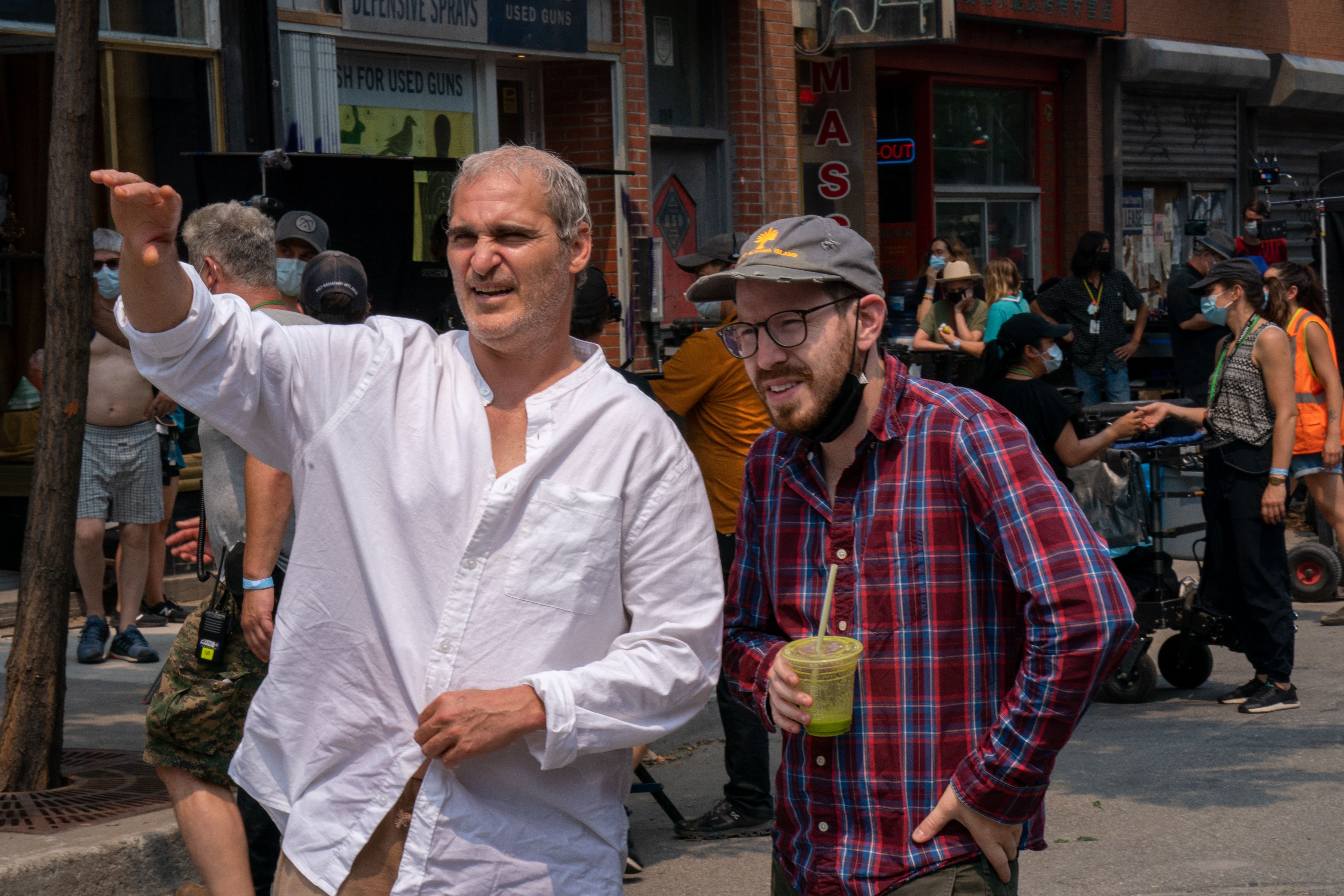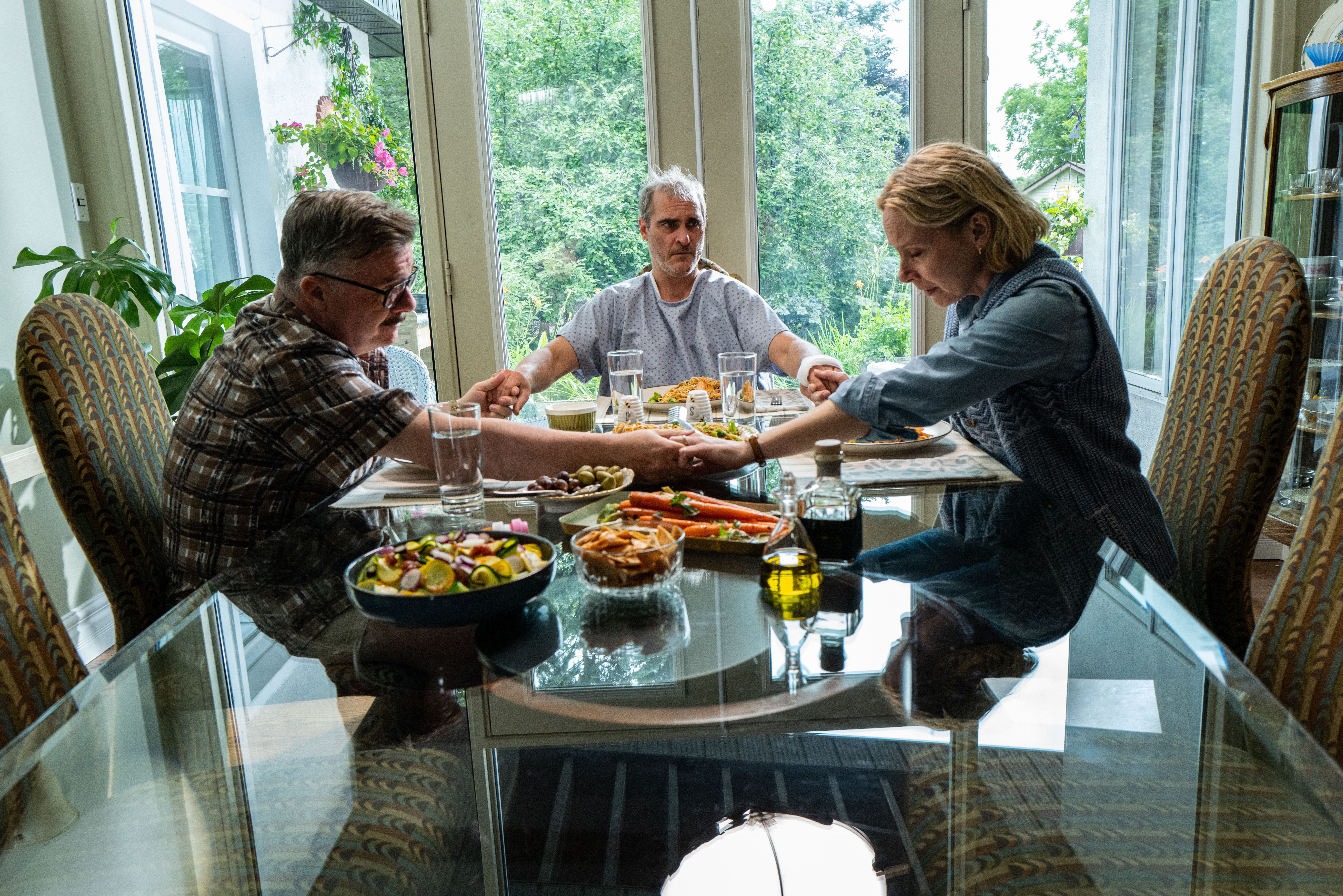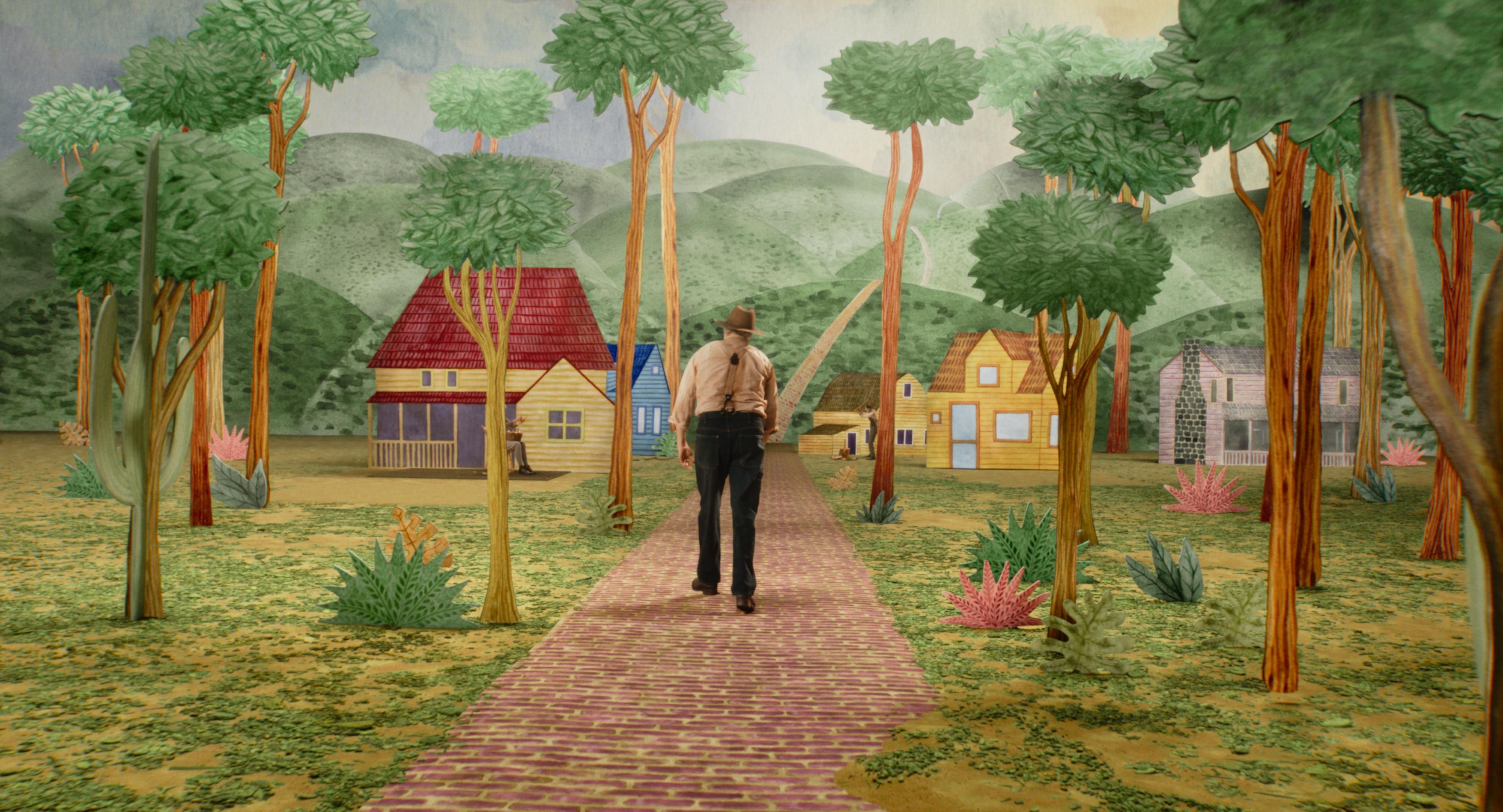Now well-known for his previous two features, Hereditary and Midsommar, filmmaker Ari Aster returns to theaters with the Joaquin Phoenix-led Beau Is Afraid. From the trailers alone, Aster’s third film gives bizarre, disturbing vibes, but they don’t quite scream horror, as the auteur is currently known for. In a group interview including Collider’s Editor-in-Chief, Steve Weintraub, Aster and Phoenix share a few details that help pinpoint where exactly on the cinematic map this odyssey lands.
In Beau Is Afraid, Phoenix plays the titular son, Beau Wassermann, who’s riddled with anxieties in a world that’s already violent enough without his having to get out from under his mother’s (Patti LuPone) thumb. In the interview, which you can read below, Aster muses on the recurring theme of dysfunctional families within his films, which is in no short supply with the Wassermanns. As for the outlandish whimsy that barely keeps Beau from tipping into full-blown horror, Aster also discusses the extensive world-building that went into the production, how the script changed from page to screen, and why this idea stuck with him for so many years.
Before catching Beau Is Afraid in theaters, find out what about this particular project appealed to Phoenix, what depravities the director and actor learned about one another through filming, and how they found one of Phoenix’s greatest moments in the movie.
COLLIDER: Joaquin, I'll start with you with an individual question. I know that you get offered scripts and a lot of projects. What was it about this material that said, “I want to do this,” and I’m also curious what it was like reading the script for the first time?
JOAQUIN PHOENIX: The script was like wholly original, and that's always exciting, right? I think I'm always looking for something that feels unique. But really, it was the conversations with Ari that I think made the difference between me doing it or not. I think more often than not, I make my decision, not based on a filmmaker's previous work, but based on how they talk about the film that they want to make. And really, we spoke for, like, four days in a row or something, right? [To Aster] When you first sent it to me I feel like we talked for hours.
ARI ASTER: Yeah, but I mean, we had so many conversations that went over the course of months.
PHOENIX: Right, but I mean, there was this initial–
ASTER: No, no, no, you're right. That first week we got on every day.
PHOENIX: Like every day. In some ways, you don’t make a decision because you figure it out and it's a guarantee, and you know how it's gonna work. You make a decision because you have more questions and you're still curious. I think if I had a conversation with a filmmaker and I felt like, “Oh okay, I get it. I know what this is,” I wouldn't want to make the movie. I think because those conversations and those questions lead to more questions, that's what makes me ultimately want to have the experience.
So Joaquin, your performance in this movie is nothing short of phenomenal. Are there any characters that you played in the past that you drew from when you were figuring out the character of Beau?
PHOENIX: No, certainly not consciously, no. Honestly, I think it was the most difficult. It's pretty confounding, I think I really struggled in the beginning, like, how does he accept what is happening in this world? And so, I think it's so difficult because before we kind of got into it and started to understand it, it would drive me crazy. Like, “I don't get it. Why would you not comment about that? Why would you not say something?” And it was really trying to discover his nature and how much he accepts about this world and doesn't question.
So I think that was kind of one of the most difficult things, and it felt like it was a few weeks in before that I stopped asking those questions, and I stopped questioning the world and how he behaves in it.
Ari, this is one is for you. You wrote Beau a long time ago as your first feature. What made you decide that now was the time to come back and revisit this and make this your third film?
ASTER: Well, it wasn't the first one that I tried to get made. Let's be clear, I tried to get so many movies made. This is just one of them. And then I decided to write like a spooky-scary and finally get a green light. But this one just was always special to me. It was just a world that I loved, and that world kind of gave me license to throw in ideas and set pieces that just wouldn't fit in any other context. And so, I've always been excited about making this just because it always felt to me like the most liberating of the films, like the one that would allow me the most freedom to just kind of go wherever I wanted to go. It's been on my mind for a long time for that reason, and I'm really glad that it didn't get approved before I made those other two films because I wouldn't have had the resources, I wouldn't have had Joaquin. It happened the way that it was supposed to.
For Ari, I have a question about Beau, also, your short film, and in that one, Billy Mayo was starring as the character. How do you think the character has evolved from Billy's portrayal to Joaquin's portrayal?
ASTER: Well, that first short, that was like a sketch, right? I had just graduated from AFI, I was about to move out of my apartment, and I was moving out in like three days, and I just realized, “Oh, this is a location,” you know? And those are hard to come by when you don't have any money. And so I thought, “Okay, I'm gonna write something very quickly, and it'll be like an exercise, and I'll get my friend, Billy Mayo,” who was in my thesis film at AFI, and was just a really great actor – he's died, and he was way too young.
And it was just a slap-together thing, and later on, this one plot point in that short kind of stuck with me. A guy leaving his key in the door and then, “I'm remembering one thing and going to get it from the bathroom,” and then coming back and the key is gone. That stuck with me, and then it grew, and I liked the name, Beau. If I had made it when I first intended to, I might have actually cast Billy Mayo at that time because it would have been my first film, and I probably would have made it for absolutely no money.
But the movie just kind of grew into something else like it. I don't see this as a remake of that short, or even necessarily an expansion of that short. I know that that's kind of an unsatisfying answer given that they have the same basic title, and the catalyst for the story is the same, but only to say that this story has been just kind of growing and growing for me, and that character has been both growing and almost turning more and more into this enigma, like, the character’s become even more enigmatic for me. And then, I think a big question that Joaquin and I had was, how do we build this guy up, and at the same time, retain a mystery there, and an unknowable–
An intangible quality?
ASTER: Yeah.
For Joaquin, since your character is dealing with a lot of paranoia and fear, what do you think about the interplay between the nature of a person and the nurture aspect, since he has a contentious relationship with his mom? How do you think that affects him as a person, and how that created him to be the person we see in the film?
PHOENIX: I mean, in some ways he's awfully resilient. It's incredible that some of his good-naturedness, kind of a sweetness, a goodness, is relatively… that he has been tested from his childhood on, and pushed to the brink. And I think that was something that was important for us to identify early on, like who was he when he was born? And that felt like that was our goal very early on was to try to discover who that was.
COLLIDER: Joaquin, what surprised you about working with Ari on set? And Ari, what surprised you about working with Joaquin on set? Because you really don't know how someone's going to be until you're actually in the thick of it and you've spent weeks together, and you run into an obstacle, or whatever it may be. What surprised you about each other?
PHOENIX: I don't know that it surprised me, but what I appreciated was how perceptive and sensitive Ari was, which obviously, is really important in the relationship to an actor and a director, right? Can they identify when I'm truly in this, when I'm truly in the experience, or when I'm just acting? And that was very important.
But I think also, early on in our conversations I realized how funny it was, but seeing all of the– there's so many visual jokes in this movie. So, just walking around on set, there are things that I was seeing that you would probably only pick up after, like, the fifth viewing. But I was surprised at how morally depraved he truly was. He doesn't look it, but he's a very, very sick person.
ASTER: [Laughs] Yeah, I was pretty surprised by Joaquin’s depravity. That was a nice surprise. In some ways, the experience was– there was a confirmation of a lot of things because I was really a big fan of his. There are a lot of things he's done in the past that really struck me, and I've wanted to work with him, I mean, honestly, since I probably first thought To Die For. But I remember seeing I’m Still Here and thinking that was one of the best performances I've ever seen of anything. [It was] just so funny, and not just what he was doing as an actor, but also just what he was doing with his own name because that really struck me as like a suicidal gesture in a really exciting way.
And then, you know, Freddie Quell, and there are so many things he's done that I knew what he could do. So there was no surprise as to, “Oh, this guy's great!” If anything, my sense of him was that he was somebody who kind of needed everything to be spontaneous, couldn't work out anything in advance, essentially wasn't technical, that it was all feeling. And then what I learned was that everything he does is very intentional, and he's able to do things over and over and over again if you need him to. But the thing is, if you do something over and over and over again, it can easily become rote, and that's when he stops and needs to bring it back to life, which is a really good thing because it also forces me back into engagement with whatever that moment is. And that's the best thing anybody can do for you when you're making a film is to just keep you engaged and keep the thing itself alive. And so, that was, I think for me, the biggest, the most beautiful part of this whole experience was just that.
Ari, what was your writing process like for Beau Is Afraid? How did it differ from some of the other scripts that you've written, and how did you take the script that you wrote and kind of adapt it to working with Joaquin?
ASTER: Well, the writing process is always kind of the same. You're just feeling your way through something, and if something excites you, for whatever reason, you just trust that. I don't know, writing just needs time because sometimes you can find the shape of something, and that means that a lot of scenes are essentially like devices, or they're bridges from one scene that you love to another scene. I think the challenge is, how can I make sure that by the time we're shooting, none of these scenes are just obligatory like, we gotta do this in order to do that, you know?
I had the time with this one to do that for myself, to be able to read over it, over and over again, and kind of feel in my own body when I was just not in it. It's very hard to sometimes recognize that you're not even liking something you've written because it's so familiar that it just feels right, you've read it over it many times, it just is a fact. In the process of shooting the film, that never stops, that feeling of like, okay, as we come into this, let's just be really open to what this can be, as opposed to what it necessarily is.
I don't think the writing really changed in the shooting of the film, that's not what changed. I mean, every now and then it's like, Joaquin will say, “Why the fuck am I saying this? I don't want to say this.” So, I'll say, “Well, then you don't get to say anything.” I'll take the line away. But, yeah, it's not the writing that changed.
PHOENIX: The only thing that comes to mind is there was one scene with exposition, which is like death to an actor. We sat through lunch trying to figure out the scene, and my solution was, just cut out that section of the movie. And Ari was like, “I can't do that.” I was like, “No, you don't really need it, it's the dad, who cares?” We really struggled with it, through lunch, and then just by good fortune, we were shooting–
ASTER: You should be vague about it so there are no spoilers, but go ahead.
PHOENIX: I don't even know what I'm gonna say. We're shooting the other actors first, and in that process of being off-camera it just suddenly occurred to me how I could interact, and that I could get that dialogue out in a way that didn't feel expositional and felt real. And I remember talking to you about it outside and we weren't sure, like, would it work? And then I got so embarrassed that we went, we did a couple of takes, and I didn't try it. And then after a few takes, you're like, “Why aren't you trying the thing?” And I was like, “I don't know, I don't know if it'll work. I'm embarrassed.” You're like, “Just try it, try it,” and then we tried it and it worked.
ASTER: I mean, it didn't work. It's like your best moment in the film. It was amazing. Thank God.
PHOENIX: It was just chance. Well, we sat down and we labored over it and talked about every possibility.
ASTER: And we were really hitting a wall on that, and that was a wall that was there in prep, too. We had identified that early on it, like, we need this information, but how can this not be– ?
PHOENIX: And by the way, lunch is at midnight because it's a night shoot. So you're on a night shoot with the clock ticking already in a sequence that you don't have enough time for, and you're trying to figure out this moment that feels very important to the story and very important to the character, and that's one of those high-stress moments that are so enjoyable. They're miserable to go through, but it's such an exhilarating experience to feel that kind of pressure.
Joaquin, you talked a little bit about the production design of the movie and that's something that really stood out to me when I was watching it. So, Ari, I wondered if you could talk a little bit about your collaboration with Fiona Crombie. The thing that a lot of people may take away from this is that big theater set piece, but the work she does throughout the film is also really, really breathtaking. So I wanted to just hear a little bit about how you collaborated to create the incredible look and feel of this world.
ASTER: Well, Fiona is wonderful, and we started working very early on on just kind of color-coding each world, and making sure that there was this overarching color palette so that all the worlds were kind of cohesive with each other, but at the same time, very stark and very different, or very stark in their differences. Again, because this was an invented world, which was basically a mirror of the world we're in now, but just a little bit worse, like everything that's awful about this world is just a little more extreme. And so, because of that, again, I had license to just build out every part of it. So everything needed to be invented along with it.
So, the names of the shops, billboards, posters, band names, products, everything. There are things that people won't ever see, but even the water that you need to get from the bodega, that's a brand of water that we made up, that was called Agua Magestica, that's an MW product.
But these are things that you might not see, but that mean the world to me, and I think to all the people that are on the set because it makes this world very real. There's this thing, and Will Elder of Mad Magazine coined this term “chicken fat,” which is used to describe the overabundance of background gags in a given panel. And I wanted this film to have a lot of chicken fat – and that's actually a term that I learned from my friend, Dan Clouds. I did not know that term until read an early version of the script, and he was like, “There's a lot of chicken fat here.” So that's where I learned this term. I knew I already loved it, but I just didn't have the name for it.
What I love about chicken fat, first, just like as a reader or as a viewer, is that I see the thought and care that went into the world, and it encourages a different kind of engagement for me to really search the frame and to really pay this thing respect because I feel respected as a viewer. And so, it's just something I believe is worth the effort. And if you have the chance to make a film, which you don't have every day, there should never be any point at which you've stopped building it out until it's over.
The nature of your films, Ari, it seems like there's always a thread about family and horror that comes from being in disturbing families. Why is this thought either important to you, or why do you think it keeps coming back up in your work?
ASTER: I just think families are great fodder for drama, right? They're the people that we're closest to. If it's the family you're born into, then you don't have any choice in the matter, but you also can't ever really detach from them, and I think that's a very interesting situation. And then, I think chosen families are very interesting, and I think that those are usually a response to the family you're born into. I don't know, it just feels to me like an endless thing.
I think it would be hard to find work that isn't engaged at all with those questions. So I know that it's a preoccupation for me, but it always feels to me like the obvious place to start and end. I don't know. But now that you ask it, I'll never do it again. I need to get away from– you are right. I'm just spinning my wheels at this point.
Beau Is Afraid is now playing in New York and Los Angeles and expands into more theaters April 21.

